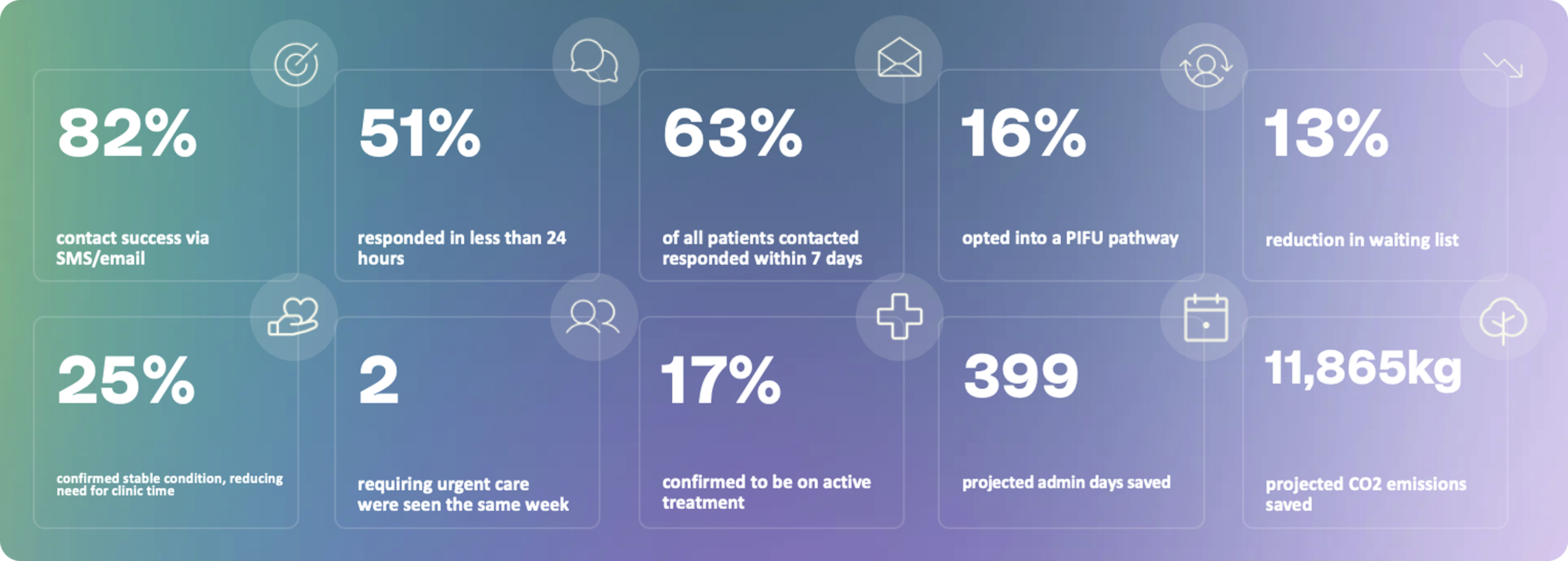Discover how Royal Devon University Healthcare reduced their waiting lists by 13%, engaged 82% of patients and project to save 600+ clinical and admin days.
Customer story
Waiting lists cuts by 13% at Royal Devon University Healthcare with DrDoctor & Epic integration
%20(5).jpg?width=990&height=743&name=Royal%20Devon%20%26%20Exeter%20Hospital%20(Wonford)%20(5).jpg)
Here's the TL;DR
Royal Devon University Healthcare (RDUH) were tackling record-high waiting lists, especially in departments like Rheumatology, with thousands of patients waiting on follow-up care through traditional and inefficient communication methods.
DrDoctor partnered with Epic to develop a first-of-its-kind digital integration that would use SMS-based communication and Epic’s Electronic Health Record system, creating an automated, scalable solution to validate patient follow-ups and prioritise care.
Patients on the waiting list were contacted via SMS and taken through a questionnaire, their responses fed directly back into Epic in real-time.
RDUH saw a 13% reduction in waiting lists and high levels of patient engagement, with over 600 clinical and administrative days projected to be saved, setting a benchmark for digital innovation in NHS productivity.
Let’s set the scene
As well as serving over half a million patients annually, RDUH also happens to operate as the largest employer in the region.
Before the Covid-19 pandemic, the Trust was already facing the national challenge of tackling record-high waiting lists, particularly in specialties like Rheumatology, where thousands of patients awaited follow-up care.
As a result, in 2020 RDUH adopted Epic’s Electronic Health Record system. This adoption was a strong indication of patients' appetite for digital healthcare, with over 100,000 people registering on its patient portal.
RDUH knew it was time to undergo a further digital transformation to give their patients the kind of care they wanted and needed.
Patients served annually
Staff employed
Square miles covered
So, what's the deal?

Rheumatology clinics were overwhelmed with patients waiting for follow-up appointments – and their traditional communication methods only exacerbated this problem.
Calls and letters were no longer efficient. Instead, they were resource-heavy, and poorly suited to modern day patient lifestyles.
As well as this, delays and manual processes hampered clinical teams’ ability to triage effectively, creating undue risk and stress for both staff and patients.
The Trust needed a way to contact patients quickly, gather up-to-date clinical insights, and shift appropriate patients to a Patient Initiated Follow-Up (PIFU) pathway.
And here's what we did
We collaborated with RDUH and Epic to design a fully integrated, automated digital engagement system.
With Epic's native waiting lists and the HL7 standard, patients received an SMS and were guided through a structured, simple questionnaire – all without needing to download an app.
Patients identified on the waiting list were sent messages at set intervals, and their responses were fed directly back into Epic in real time. This “set-it-and-forget-it” system ensured once patients were added to the waitlist, everything else happened automatically – from outreach all the way to triage.

for patients
So that now...
The integration is a first of its kind in the UK, allowing staff to shed heavy admin burdens.
Once set up, the system began to run itself: patients are added to the wait list, questions are automatically sent out at set-intervals, and answers are immediately written back to Epic.
The data appears in real-time, available to all staff involved in the patient’s care, allowing them to deliver timely and accurate care and reduce clinical risk.
Data also files directly back to update waiting lists, helping staff place patients on PIFU pathways or initiate clinical triage.
- Fast-moving care
Clinics can rapidly assess and triage thousands of patients without putting further strains on staff capacity and time. - Patient prioritisation
Patients needing urgent care are prioritised based on real-time data and stable patients are moved onto PIFU pathways to free up appointments. - A scalable solution
Staff across different specialities can benefit from a low-effort digital solution with tailored content that has now become part of day-to-day care.
The impact
The results?
A blueprint for scalable, efficient care delivery with measurable results - offering new and exciting potential across the NHS.
